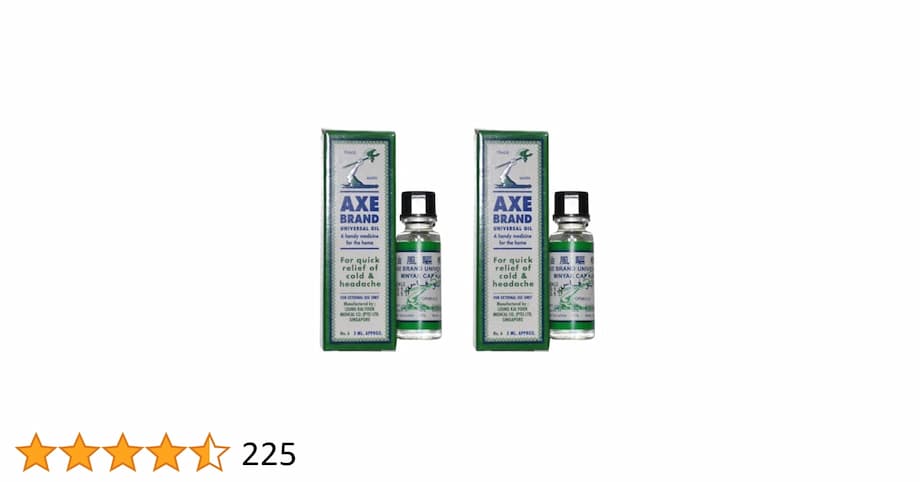The Enduring Legacy of Axe Brand in Singapore
For nearly a century, Axe Brand Universal Oil has been a quiet yet powerful presence in Singaporean households. Its distinctive scent, instantly recognizable packaging, and reputation for soothing relief have made it a staple across generations. As Singapore marks milestones like SG60, the story of Axe Brand is not just about a medicated oil—it is a reflection of Singapore’s resilience, innovation, and cultural memory.
- The Enduring Legacy of Axe Brand in Singapore
- How Axe Brand Began: Roots in Heritage and Innovation
- From Local Staple to Global Icon
- What Makes Axe Brand Universal Oil Unique?
- Adapting to Changing Times: Innovation and Quality Assurance
- Axe Brand and Singapore’s National Memory
- Singapore Heritage Brands: A Broader Context
- In Summary
Founded in 1928 by Leung Yun Chee, Axe Brand’s journey from a small local business to a global heritage icon is a testament to the power of tradition, adaptability, and community trust. Today, the brand stands as one of Singapore’s most beloved and enduring products, celebrated not only for its efficacy but also for its role in the nation’s collective identity.
How Axe Brand Began: Roots in Heritage and Innovation
The origins of Axe Brand Universal Oil trace back to the 1920s, when Leung Yun Chee, an immigrant from Shunde, China, arrived in Singapore. Initially working as a manager at a silk trading company, Leung’s entrepreneurial spirit led him to seek new opportunities. He obtained the formula for a medicated oil from Dr. Schmeidler, a German physician, and began producing what would become Axe Brand Universal Oil in 1928.
The oil’s formulation—combining menthol, camphor, eucalyptus, and lavender oils—was designed to provide gentle, natural relief for a range of minor ailments. From headaches and nausea to muscle aches and insect bites, the product quickly gained a reputation for its effectiveness and affordability.
Leung named the oil after the axe, a common household tool in Singapore at the time, symbolizing reliability and everyday utility. The iconic blue and green packaging, featuring an arm wielding an axe, became a visual hallmark that endures to this day.
Early Challenges and Creative Marketing
Despite its now-legendary status, Axe Brand faced stiff competition and a lukewarm market response in its early years. Leung Yun Chee’s marketing ingenuity was crucial to the brand’s survival. He advertised in local newspapers, started his own Chinese-language newspaper, and distributed calendars and promotional gifts to raise awareness. These efforts helped Axe Brand stand out in a crowded market and laid the foundation for its future growth.
From Local Staple to Global Icon
By the 1960s, Axe Brand had become a household name in Singapore. Its popularity soared among Muslim pilgrims traveling to Mecca for the haj, who found the oil invaluable for relieving seasickness and other discomforts during their long journeys. Word of mouth among pilgrims helped Axe Brand expand its reach to Indonesia, Pakistan, Kenya, and beyond.
After World War II, with overseas trade resuming, Axe Brand seized the opportunity to expand internationally. The brand entered markets in Malaysia, Indonesia, and later the Middle East, Africa, and eventually the United States, Australia, and Europe. Today, Axe Brand Universal Oil is sold in over 50 countries, with packaging translated into numerous languages to cater to its diverse customer base.
According to the National Library Board of Singapore, the company now operates five GMP-certified factories across Asia, ensuring consistent quality and supply for its global markets. The oil remains a top souvenir for travelers and a symbol of Singaporean ingenuity abroad.
Recognition as a Singapore Heritage Brand
Axe Brand’s impact on Singaporean culture has not gone unnoticed. The brand has been recognized as an indigenous Singapore Heritage Brand and has received the prestigious Superbrand Award, underlining its status as a trusted family favorite. Its products are featured in exhibitions by the National Heritage Board, alongside other iconic made-in-Singapore products, fostering national pride and awareness of local industry achievements.
What Makes Axe Brand Universal Oil Unique?
At the heart of Axe Brand’s enduring appeal is its simple yet effective formula. The oil is colorless, non-staining, and blends essential oils known for their therapeutic properties:
- Menthol: Provides a cooling sensation and helps relieve headaches and nasal congestion.
- Camphor: Offers anti-inflammatory and pain-relieving effects.
- Eucalyptus Oil: Known for its soothing aroma and ability to ease respiratory discomfort.
- Lavender Oil: Adds a calming fragrance and mild analgesic properties.
This combination allows Axe Brand Universal Oil to address a wide range of minor ailments, making it a versatile “therapy in a bottle.” Its affordability and accessibility have further cemented its place in daily life, especially in multi-generational households where remedies are shared and passed down.
Community Trust and Generational Use
For many Singaporeans, Axe Brand is more than just a product—it is a shared memory. The familiar scent evokes nostalgia and comfort, recalling moments when parents or grandparents would reach for the bottle to soothe a headache, insect bite, or stomachache. This generational trust is echoed in online forums and social media, where locals list Axe Brand alongside other staples like Tiger Balm and Mopiko as essential remedies for everyday aches and pains.
As one Singaporean shared in a community discussion, “Axe brand medical oil—for minor headaches. Tiger balm lotion—for muscle aches. I love these local staples.”
Such testimonials highlight the deep-rooted place Axe Brand holds in Singapore’s collective consciousness.
Adapting to Changing Times: Innovation and Quality Assurance
While tradition is central to Axe Brand’s identity, the company has not shied away from innovation. Over the decades, Leung Kai Fook Medical Company has invested in modern manufacturing facilities, quality control, and international certifications. In 1992, it became the first local medical oil producer to obtain ISO-9002 certification, a mark of its commitment to global standards.
Today, the company adheres to Good Manufacturing Practice (GMP) guidelines and regularly updates its processes to ensure product safety and efficacy. This dedication to quality has helped Axe Brand maintain consumer trust even as health trends and regulations evolve.
Challenges in Reaching Younger Generations
Despite its storied history, Axe Brand faces the challenge of staying relevant to younger consumers. Some view its traditional packaging and marketing as old-fashioned, and the brand must compete with a growing array of modern wellness products. Industry observers note that while authenticity is a strength, revitalizing the brand’s image could help attract new users without alienating its loyal base.
As noted in a brand analysis, “Despite its international success and iconic status, the brand could benefit from revitalization to attract a new generation while maintaining its authenticity.”
Efforts to modernize may include updated packaging, digital marketing campaigns, and new product lines that appeal to contemporary lifestyles.
Axe Brand and Singapore’s National Memory
Axe Brand’s story is intertwined with Singapore’s broader narrative of nation-building, resilience, and cultural preservation. The brand’s inclusion in heritage exhibitions and collections—such as the National Heritage Board’s showcase of made-in-Singapore products—underscores its role in shaping national identity.
Events like the “When Nations Remember” conference, organized by the National Library, highlight the importance of preserving collective memories and everyday artifacts. Axe Brand, with its enduring presence and cross-generational appeal, serves as a living example of how commercial products can become vessels of national memory.
Corporate Social Responsibility and Community Engagement
Beyond its commercial success, Leung Kai Fook Medical Company has contributed to Singaporean society through philanthropy and community support. The company has donated to hospitals, educational institutions, and arts organizations, and has supported research on aging at the National University of Singapore. These efforts reflect a broader commitment to social responsibility and the well-being of the communities it serves.
Singapore Heritage Brands: A Broader Context
Axe Brand is not alone in its journey as a heritage brand. Singapore boasts several other enduring businesses—such as Yeo Hiap Seng, Bee Cheng Hiang, and Killiney Kopitiam—that have weathered economic upheavals, wars, and pandemics. These brands share common traits: adaptability, innovation, and a deep connection to local culture.
According to a report by Vulcan Post, Singapore saw over 50,000 business closures in 2022, the highest since 2016. Yet, heritage brands like Axe Brand have survived and thrived by evolving with the times while staying true to their roots. Their stories inspire pride and offer valuable lessons in resilience for future generations of entrepreneurs.
In Summary
- Axe Brand Universal Oil, founded in 1928, is one of Singapore’s most iconic heritage brands, known for its effective, affordable remedy for minor ailments.
- The brand’s success is rooted in its unique formula, creative marketing, and adaptability to changing times.
- Axe Brand has expanded from a local staple to a global product, now sold in over 50 countries and recognized as a Singapore Heritage Brand.
- Its enduring appeal lies in generational trust, cultural significance, and commitment to quality.
- Challenges remain in attracting younger consumers, but innovation and authenticity continue to drive the brand’s evolution.
- Axe Brand’s story reflects Singapore’s broader journey of resilience, memory preservation, and national pride.












